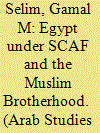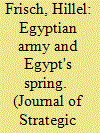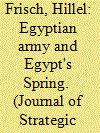| Srl | Item |
| 1 |
ID:
145627


|
|
|
|
|
| Summary/Abstract |
This article seeks to examine the dynamics of counter-revolution in Egypt following the January 2011 revolution and their corresponding impact on the path of democratization in post-Mubarak Egypt. It argues that the popular calls for change that followed the Egyptian revolution have fallen repeatedly and quickly into the hands of a structural alliance of reactionary and constancy-oriented actors operating at the internal and external levels. These included the Egyptian Supreme Council of the Armed Forces (SCAF), the Muslim Brotherhood, and the United States with its intrusive global structure, all of which have emerged as agents of continuity and counter-revolution in post-Mubarak Egypt, in turn complicating any proposed genuine democratic transition.
|
|
|
|
|
|
|
|
|
|
|
|
|
|
|
|
| 2 |
ID:
120282


|
|
|
|
|
| Publication |
2013.
|
| Summary/Abstract |
After Mubarak's ouster, the Egyptian senior command had assumed a guardian role similar to the former Turkish model despite a shoddy performance in maintaining public order and the questionable loyalty of the lower ranked officers and the ordinary soldiers. Its relative success in managing the transition was due to the willingness of the Muslim Brotherhood and the Salafists to negotiate as stakeholders in the system rather than to battle in the streets against the Army. The Muslim Brotherhood strategy worked. In August 2012, recently elected president Morsi subordinated the military by removing the veteran Minister of Defence, the Chief-of-Staff, and other key officers. The military caved in without a whimper.
|
|
|
|
|
|
|
|
|
|
|
|
|
|
|
|
| 3 |
ID:
120294


|
|
|
|
|
| Publication |
2013.
|
| Summary/Abstract |
After Mubarak's ouster, the Egyptian senior command had assumed a guardian role similar to the former Turkish model despite a shoddy performance in maintaining public order and the questionable loyalty of the lower ranked officers and the ordinary soldiers. Its relative success in managing the transition was due to the willingness of the Muslim Brotherhood and the Salafists to negotiate as stakeholders in the system rather than to battle in the streets against the Army. The Muslim Brotherhood's strategy worked. In August 2012, recently elected President Morsi subordinated the military by removing the veteran Minister of Defense, the Chief-of-Staff, and other key officers. The military caved in without a whimper.
|
|
|
|
|
|
|
|
|
|
|
|
|
|
|
|
| 4 |
ID:
126234


|
|
|